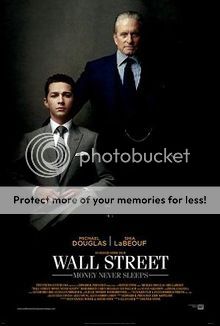February 3, 2011 - An Insider's Review of Wall Street: Money Never Sleeps
Featured Trades: (WALL STREET)
3) An Insider's Review of Wall Street: Money Never Sleeps. One of the great things about flying first class is that you often get to meet some pretty interesting people. During the early eighties, I found myself on a flight from Los Angles to New York sitting next to an unknown aspiring young director named Oliver Stone, who was on his way to pitch a new film idea to potential investors.
Over six hours I enjoyed one of the most interesting conversations of my career, covering jungle combat in Vietnam, the ins and outs of movie making, and the harsh realities of Hollywood style accounting. The movie he was pitching turned out to be the 1987 industry cult classic, Wall Street.
The film sparked one of the greatest guessing games of all time, with everyone attempting to identify the real people behind the fictional characters. The villain, Gordon Gekko, was easy. That was Ivan Boesky, a risk arbitrageur who became the target of one of the first high profile insider trading case. Other links with reality were more obscure, and many real life traders on the floor of the NYSE simply played themselves as extras.
In the sequel, it is much easier to play who's who, thanks to the financial crash that seems like was happening only yesterday. Gordon Gekko, released from federal prison, this time turns into legendary hedge fund manager John Paulson, whose character turns $100 million into $1.2 billion in a matter of months through buying up cheap credit default swaps on subprime debt. Hank Paulson and Tim Geithner are easy to pick out in a crucial meeting at the New York Fed. The chairman of 'Keller Zabel' (Bear Stearns), one 'Louis Zabel' (Ace Greenberg), throws himself in front of a train on the Lexington line. Well, this is fiction, after all. The $2 dollar/share sale price gave it all away.
Many people played themselves. The whole CNBC crowd was there, their descriptions of the crash so realistic that I thought it might be archival footage. So were Warren Buffet, Nouriel Roubini, Jim Chanos, and other notables. In fact, Chanos managed to get Stone to change the original script, switching the bad guy role from a hedge fund to Goldman Sachs (GS), as it should be, referred to in the film as 'Churchill Schwartz.'. They are easily identified as the Wall Street firm that took out a big short in housing debt just before the crash.
Shia Labeouf does an outstanding job playing Jake Moore, an aggressive, razor sharp, earnest young investment banker. I have known so many like him over the years, both working for me and at competitors, that his performance really rung true. Michael Douglas, who has aged dramatically, seemed to be simply replaying the same role that he has in countless earlier films. To understand their characters, several actors opened up online trading accounts and did quite well in the market, with Shia alone reportedly booking some $20,000 in profits.
There are a few minor flaws in the film. It could have used more editing. There is a mention of '50% leverage' of subprime debt, when the correct figure was 50 times. The Chinese government investor doesn't act like a real person from the People's Republic, but as an American with a bad accent. However, these are trivial complaints. If you want to have a hoot, rent the DVD, but expect to provide a simultaneous translation about all of the different instruments and strategies if you bring any non-financial types with you. And thanks to Oliver's advice, I never got involved in financially backing a film project, despite countless invitations to do. It was the best trade I never did.

